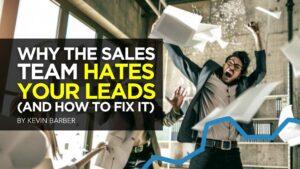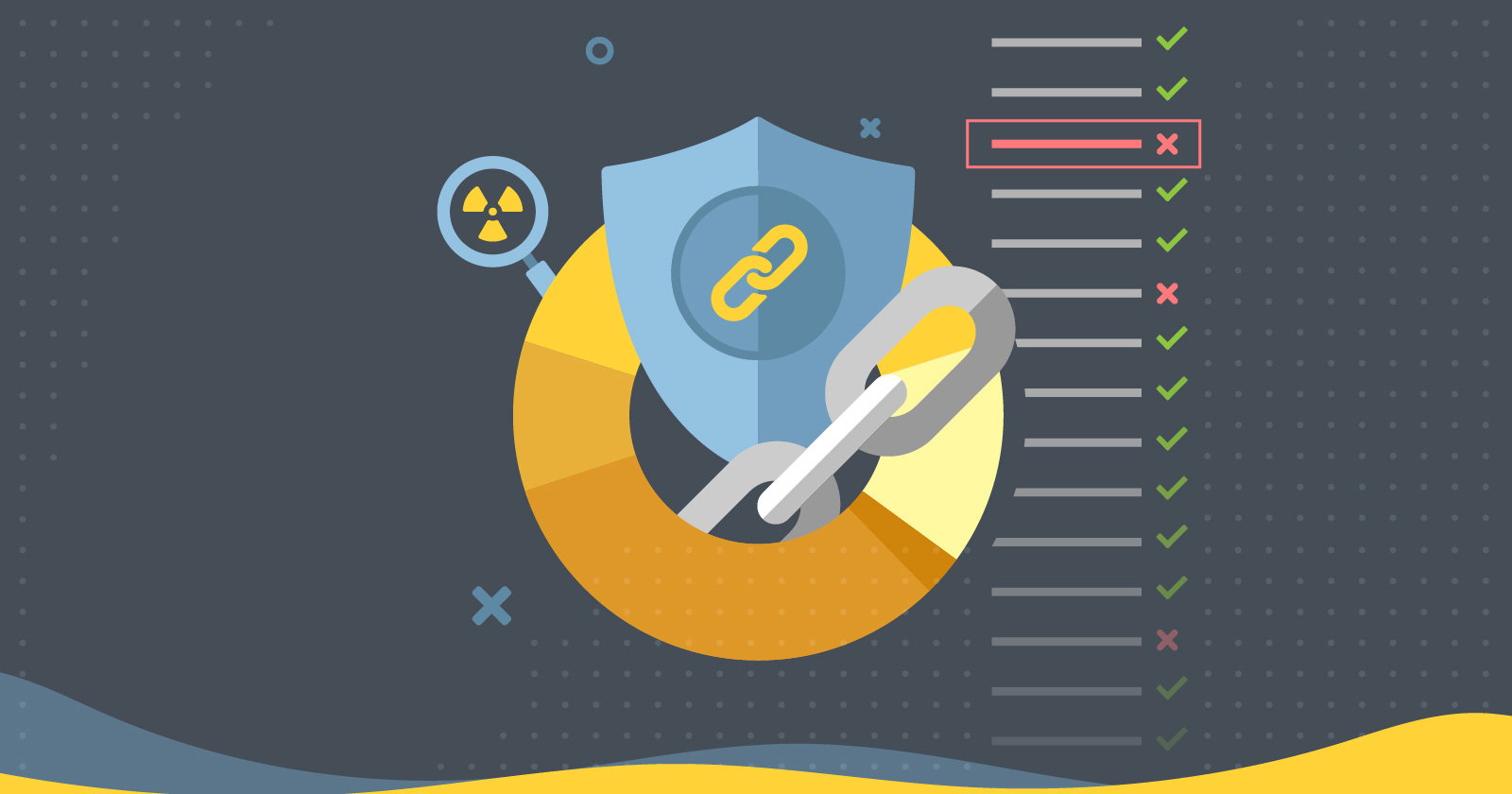
1. Toxic Backlinks Are From Spammy Sites
Most people are smart enough to know a Nigerian prince doesn’t really want to give them $10 million, but are you just as smart when it comes to noticing spammy backlinks?
There are entire websites dedicated to selling illegal or irrelevant products and these sites are usually packed to the gills with spammy backlinks, sometimes to your site.
Not only are these annoying, but they can be downright harmful to your website.
And it’s not because you don’t want them associated with your brand – if you have too many backlinks from spam sites, search engines can penalize you, even though you may be completely innocent of any wrongdoing.
In fact, many times you may not even know that spammy sites have linked to your website.
So, it’s important to always be on the lookout for spammy, bad backlinks.
2. Paid Link Mills Often Produce Toxic Backlinks
Paid link schemes have been around almost as long as search engines, from the first time someone realized backlinks contribute to rankings.
The way paid link schemes work is straightforward: links are sold either alone or as part of a package, to provide backlinks to site owners looking for a quick way to shoot up the rankings.
But search engines are aware of this tactic.
They don’t want top search engine results to just go to whoever bought the most backlinks, so these link exchanges are explicitly against Google’s Webmaster Guidelines.
As soon as search engines discover a new link mill, they start applying a penalty to sites using it.
3. Toxic Backlinks Can Come From Forum Or Blog Comment Links (Particularly Foreign Ones)
Let us start by stating: not all forum links are bad.
Those from quality sites with established users and with related content are beneficial.
However, like link mills, if you have hundreds of low-quality links coming in from foreign discussion forums, you’ll want to disavow them before they damage the ranking you’re working so hard to build.
4. Toxic Backlinks Are Sometimes Hidden
Possibly the very first black hat SEO tactic developed, unscrupulous webmasters are still trying to flimflam search engines with hidden backlinks, which are exactly what they sound like.
By using text manipulation, background colors, or other means, backlinks are hidden from users and search engines.
This is a clear violation of Google’s policies.
It’s important to make sure any links back to your site are clear, visible, and within Google’s policies.
5. Paid Or Sponsored Links That Pass PageRank Are Toxic
Another backlinking no-no is passing PageRank to the buyer of the ad.
While buying or selling pay-per-click ads is a perfectly legitimate practice, Google frowns upon links that are paid for, rather than organic.
You should always use qualifying attributes (e.g. rel=”sponsored”) to identify these links and avoid being penalized.
Make sure you’re validating link attributes to stay within Google’s policies.
How To Check & Remove Toxic Backlinks
So, we’ve got it all figured out now: safe backlinks are good, toxic backlinks are bad. But now what?
What’s the best way to check your links and clear out the ones that are harmful?
You could spend hours combing through every page of your Google Analytics account, identifying, visiting, and checking every individual link.
Or you could do it the easy way, with WebCEO Toxic Link Checker.
The most powerful and reliable spam link checker in the SEO sphere, WebCEO is integrated with Majestic, the largest link index database in the industry, which gives us access to data from over 2,371,111,956,878 URLs, with more being added daily.
It’s easy to use:
1. Quickly See All Of Your Backlinks: Analyze Your Backlink Profile At A Glance
Once you sign up for WebCEO, you’ll get a full list of domains linking to your website in a Linking Domains report.
The WebCEO Backlink Checker helps you quickly determine how many backlinks are pointing at your website, identify common anchor texts, check the diversity and authority of linking domains, and view the ratio of toxic/non-toxic links.
2. Easily Discover Good Vs. Toxic Backlinks: Identify The Quality
WebCEO’s Toxic Pages report makes it easy to determine which backlinks are helping your search credibility – and which are having the opposite effect.
You can evaluate each backlink individually using analysis metrics like anchor texts, Domain Trust Flow, Domain Citation Flow, Alexa Traffic Rank to determine which links to keep.
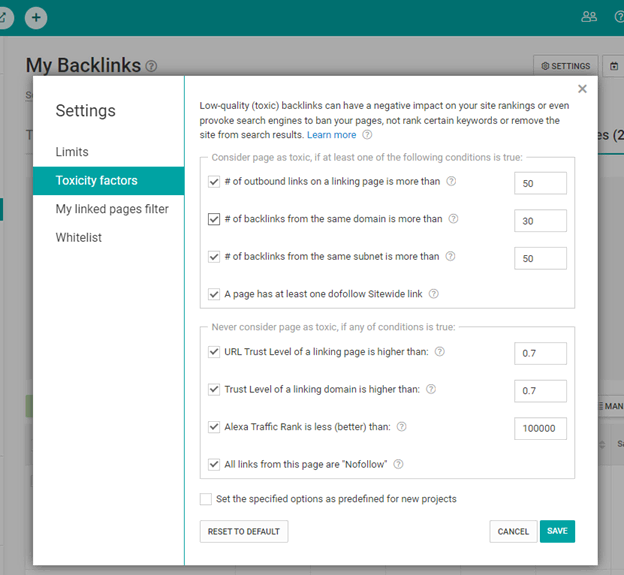 Screenshot from WebCEO, February 2022
Screenshot from WebCEO, February 20223. Instantly See Harmful Links: Which Links Are Causing Your Site To Lose Rankings?
With a proprietary toxicity formula, which can be fine-tuned to your needs, WebCEO helps you spot bad links so you can disavow them and eliminate the negative impact they have on your ranking.
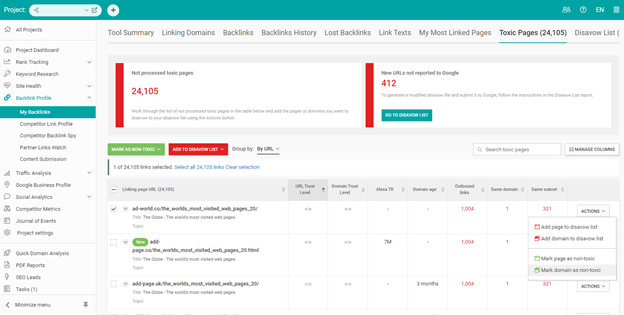 Screenshot from WebCEO, February 2022
Screenshot from WebCEO, February 20224. Remove Toxic Links & Stop Them From Harming Your Site: Disavow With Ease
It has never been easier to create, import, and export disavow.txt files.
WebCEO has integrated functionality, allowing you to do it with just a few clicks.
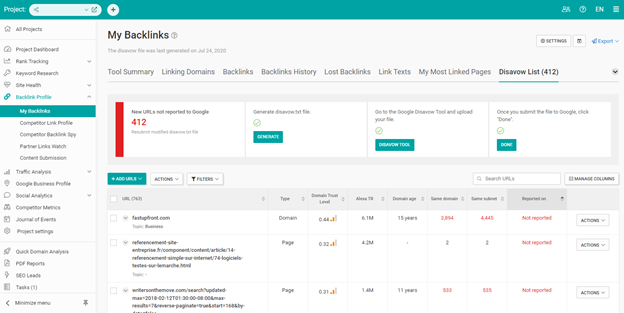 Screenshot from WebCEO, February 2022
Screenshot from WebCEO, February 20225. Get Alerts When New Toxic Backlinks Show Up: Schedule Automated Scanning & Set Alerts
Once you’ve cleaned all those pesky bad backlinks, you want to make sure they don’t reappear.
And if they do, you should be ready to disavow them.
WebCEO has an automatic toxic link alert feature that can alert you when new links to your website are discovered.
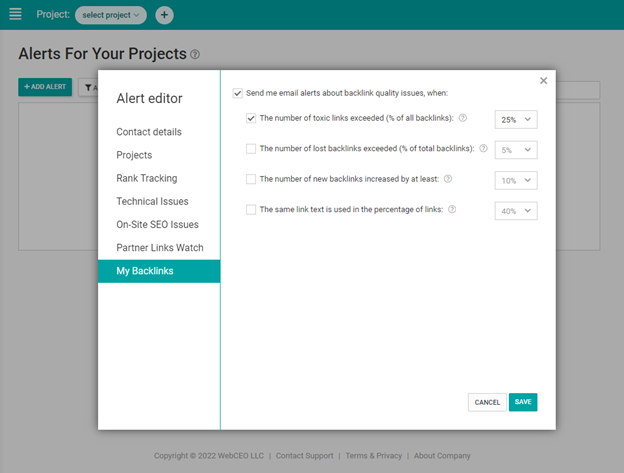 Screenshot from WebCEO, February 2022
Screenshot from WebCEO, February 2022You can set WebCEO to automatically scan websites you want to monitor.
You can also set email alerts to tasks, so you’ll know about changes immediately.
Between managing your website and staying on top of changing SEO algorithms, you have enough to do.
Take backlink evaluation and toxic link removal off your to-do list and try out WebCEO’s Backlink Checker. Sign up now and try it free for 14 days.

